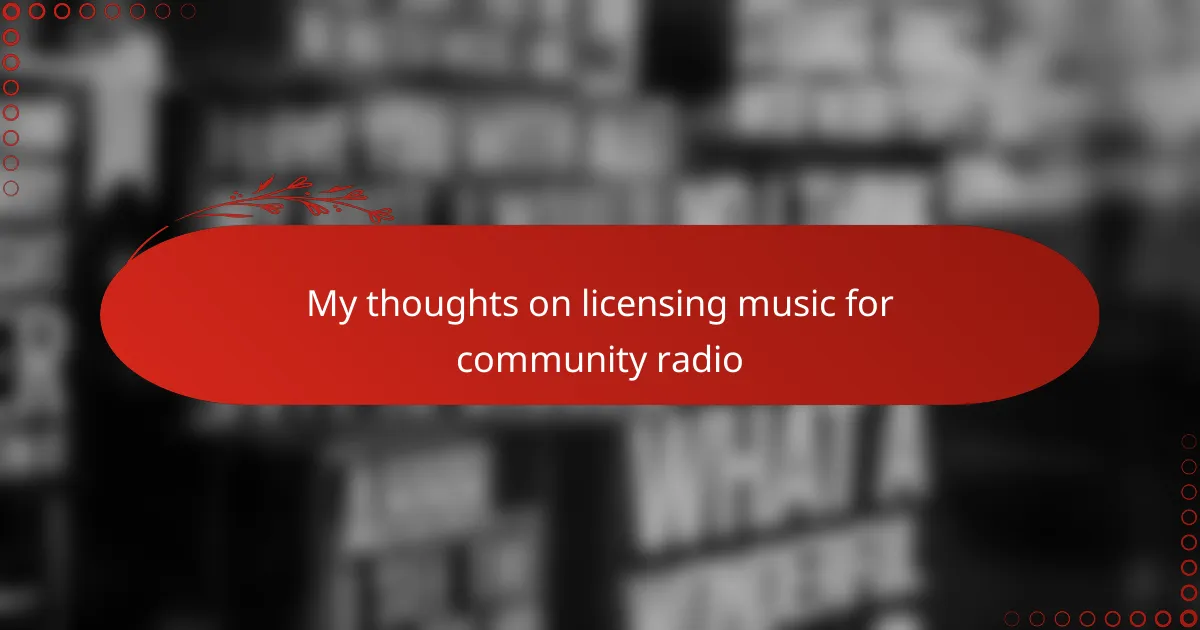Key takeaways
- Community radio fosters local connections and prioritizes passion over commercial interests.
- Music licensing is essential for protecting artists’ rights and varies based on usage, requiring careful navigation by community stations.
- Obtaining licenses can be streamlined through blanket licenses, negotiating costs, or direct agreements with local musicians.
- Challenges in licensing create opportunities for deeper connections with the music community while ensuring legal compliance.
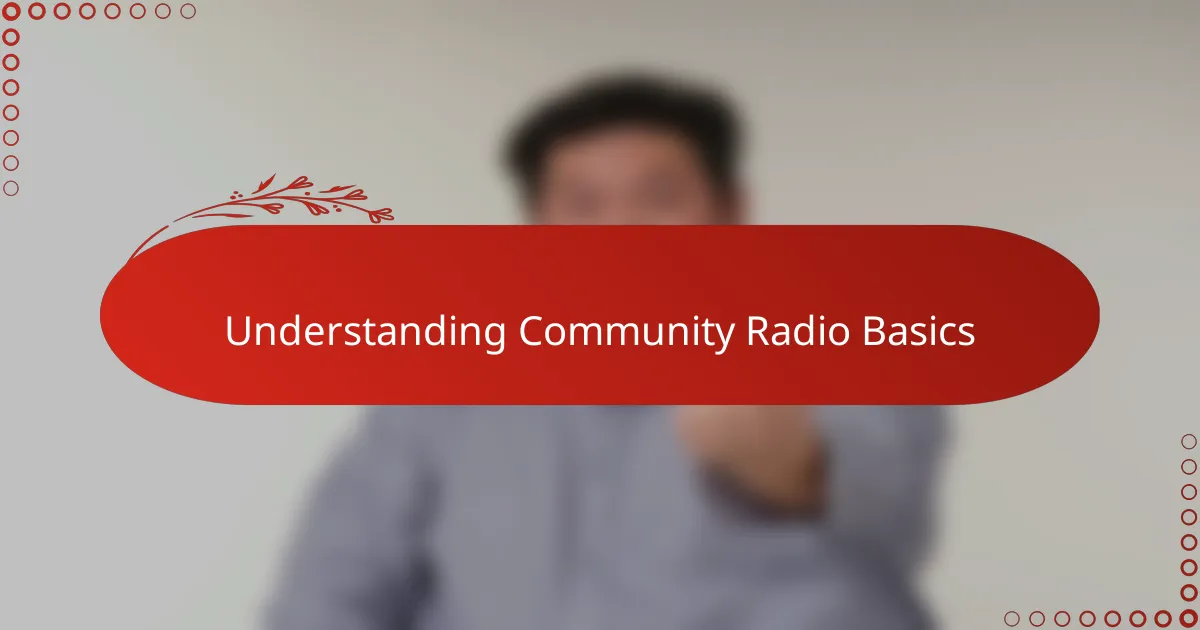
Understanding Community Radio Basics
Community radio often feels like the heartbeat of a neighborhood, doesn’t it? From my experience, it’s not just about broadcasting; it’s about connecting people who care deeply about their local stories and culture. Have you ever thought about that unique sense of belonging it creates?
What struck me early on was how community radio differs from commercial stations. Instead of chasing ratings, it thrives on passion and participation. This grassroots approach offers a refreshing reminder of what radio was originally meant to be—a shared voice for ordinary people.
Understanding community radio means appreciating its challenges, too. It operates on tight budgets and often relies on volunteers, which can be both inspiring and frustrating. But isn’t it this mix of determination and creativity that makes community radio so special?
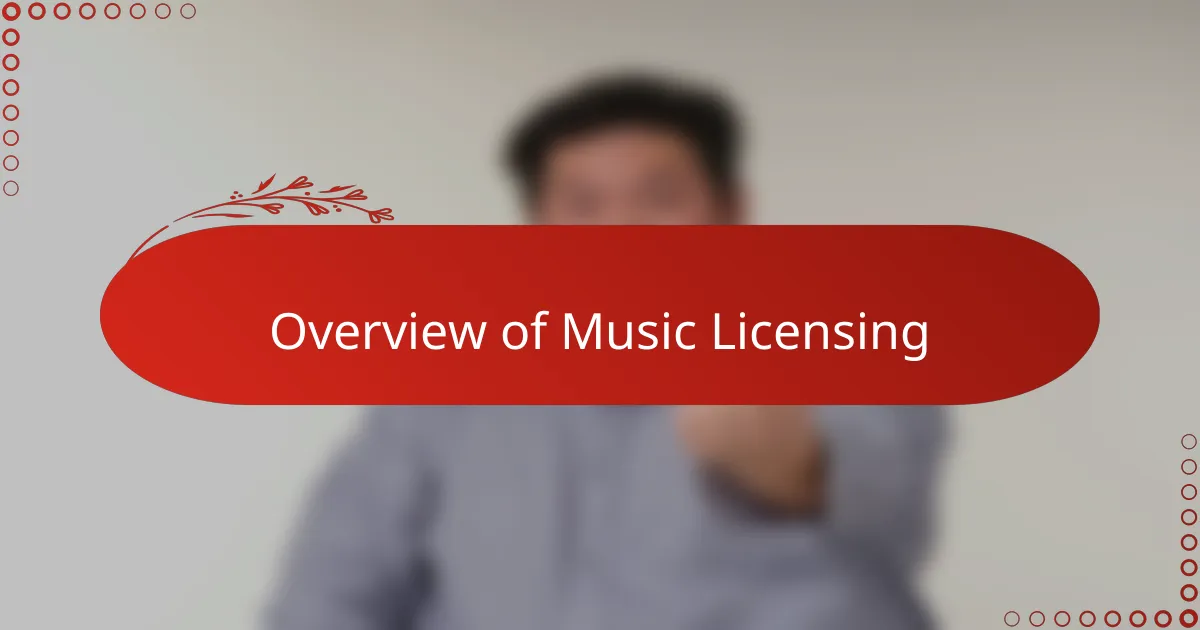
Overview of Music Licensing
Music licensing might sound like a maze at first, but from my experience, it’s really about respecting the rights of creators while sharing their work. Have you ever wondered why even community radios need licenses to play music? It’s because every song belongs to someone, and using it without permission can lead to tricky legal problems.
What I find interesting is that music licensing isn’t a one-size-fits-all deal. There are different licenses depending on how you use the music—whether it’s playing it live, recording it, or streaming online. For community radio, this means finding the right type of license that fits both the station’s budget and its mission to promote music.
Sometimes, sorting through licenses feels overwhelming, especially when you’re passionate about keeping things local and affordable. But thinking about licensing as a way to support artists makes it a bit easier for me. After all, wouldn’t you want your favorite musicians to be fairly rewarded for their work?
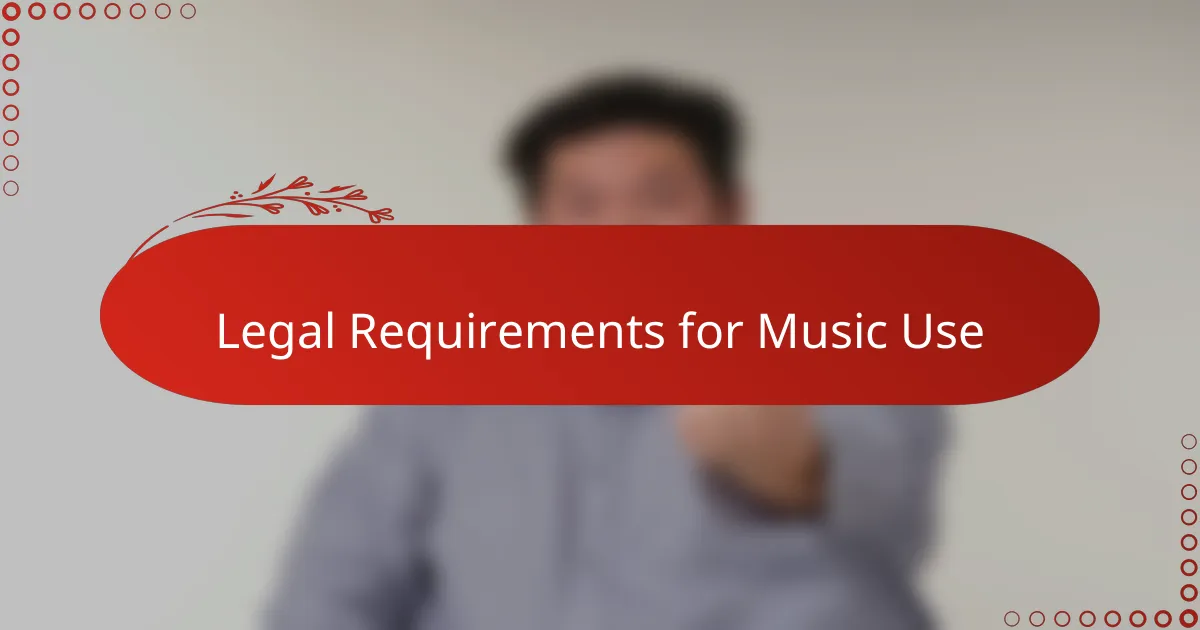
Legal Requirements for Music Use
When I first looked into the legal requirements for using music on our community station, I quickly realized it’s more than just a formality—it’s about protecting the rights of artists. Have you ever thought about what happens if a station plays music without the proper licenses? It can lead to serious consequences, including fines or even shutting down, which no one wants.
One thing that surprised me was how specific these requirements can be. Depending on whether you’re broadcasting over the airwaves, streaming online, or even archiving shows, different licenses come into play. It made me appreciate how careful we need to be to stay on the right side of the law while still sharing great tunes with our audience.
I remember feeling a bit overwhelmed by all the paperwork at first, but then I thought about the reason behind it—respecting the music creators. Adhering to these legal rules isn’t just a box to tick; it’s a way to honor the people whose art makes our radio shows special. Doesn’t that make the whole process feel a bit more meaningful?
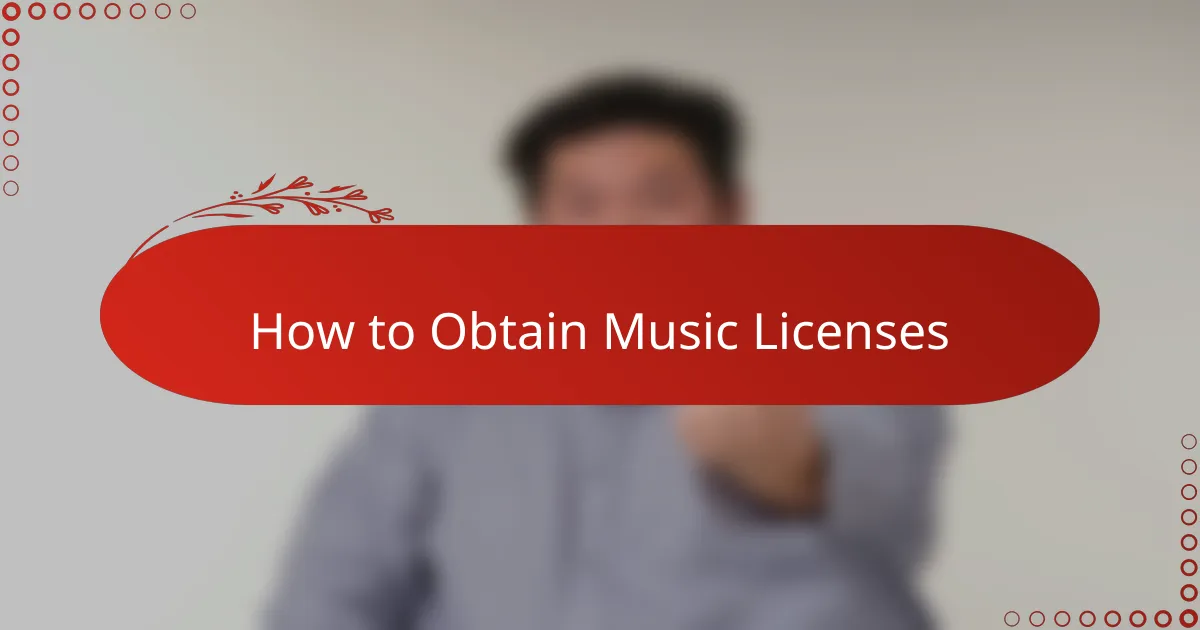
How to Obtain Music Licenses
Getting music licenses for a community radio station felt daunting to me at the start. I quickly learned the best first step is reaching out to the main licensing bodies in your country—like BMI, ASCAP, or PRS. They usually offer blanket licenses, which cover a wide range of songs and simplify the process, so I found it’s worth the effort to understand what each one offers.
I remember wondering how to keep costs manageable while staying legal. That’s when I discovered some licenses are specifically designed for smaller, non-commercial stations, often at reduced rates. Have you ever tried negotiating with licensing agencies? It can feel intimidating, but I found being transparent about your community-focused mission often opens doors and sometimes discounts.
Another approach I took was exploring direct licenses from local artists or independent labels. This not only helped with licensing fees but also deepened my connection to the music community. Isn’t it rewarding when you support musicians directly and get unique content for your station? This hands-on path taught me that obtaining licenses is not just about compliance but building relationships.
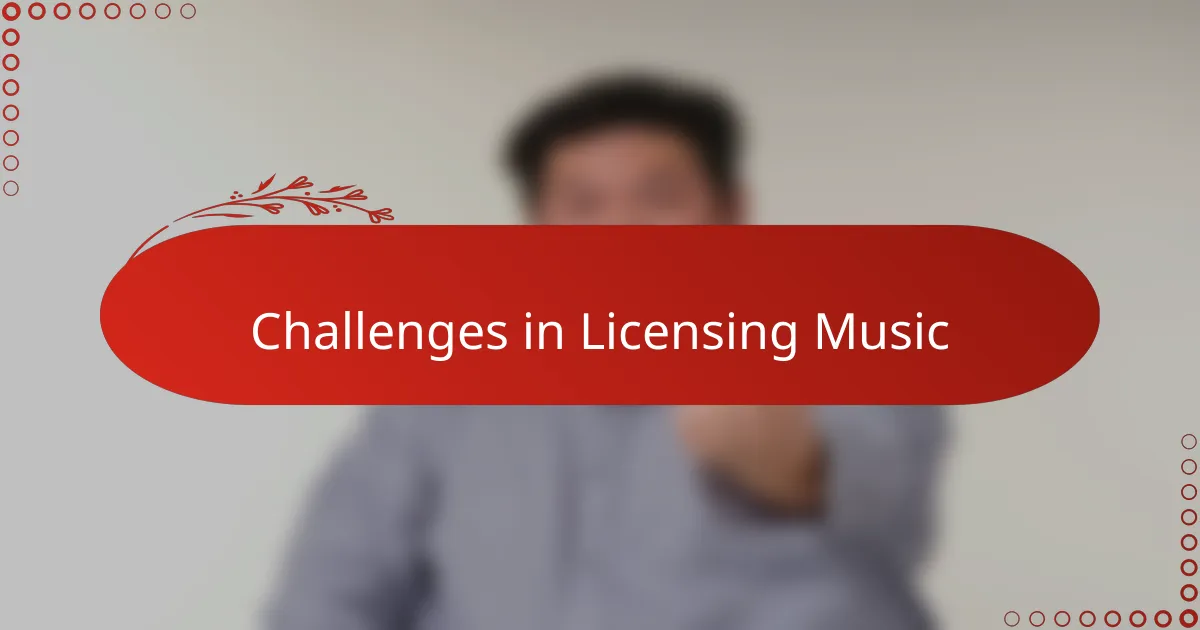
Challenges in Licensing Music
One challenge I often ran into was simply understanding the complex web of licensing rules. Have you ever felt lost trying to figure out which license covers what type of music use? I sure did—it’s like piecing together a puzzle without the picture on the box.
Another hurdle is the cost. For a community station like mine, every dollar counts, and music licenses can quickly eat into a tight budget. It made me wonder: how can we stay true to our mission of sharing great music without breaking the bank?
Then there’s the time and effort involved. I remember spending hours chasing down the right paperwork or clarifying terms with licensing agencies, which sometimes felt like a full-time job on top of running the station. But despite these challenges, I kept reminding myself that this process respects artists and keeps our community radio thriving legally and ethically.
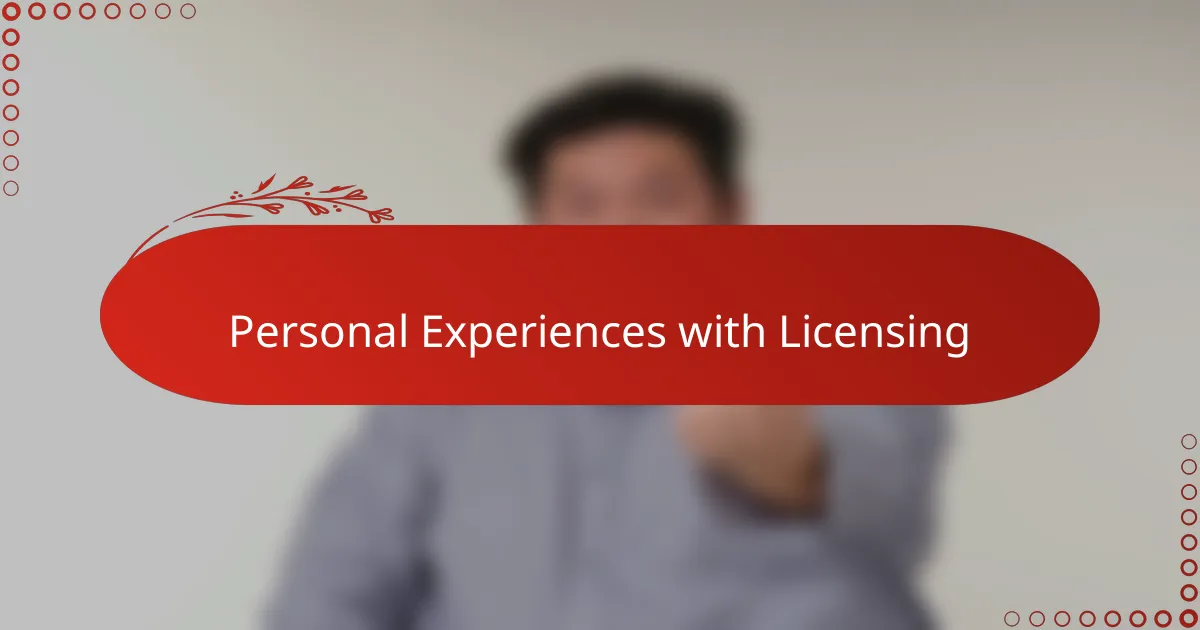
Personal Experiences with Licensing
I recall the first time I tried to secure a music license for our community station; the paperwork felt endless, and I wasn’t sure if I was navigating it right. Have you ever had that moment when a task seems so complex you almost want to give up? But sticking with it made me appreciate how much respect we’re showing to artists by doing things properly.
There was a season when funding was tight, and balancing the cost of licenses with other station needs felt like walking a tightrope. I asked myself, “Can we really afford to keep playing all the music we love while staying legal?” Finding discounted rates and direct agreements with local musicians turned out to be a lifesaver—both financially and emotionally.
One thing that’s stuck with me is how licensing became more than a bureaucratic hurdle; it transformed into a bridge connecting us with the music community. When I worked directly with independent artists for permissions, it felt rewarding to champion their work firsthand. Have you ever experienced that unexpected joy in turning paperwork into meaningful connections?
